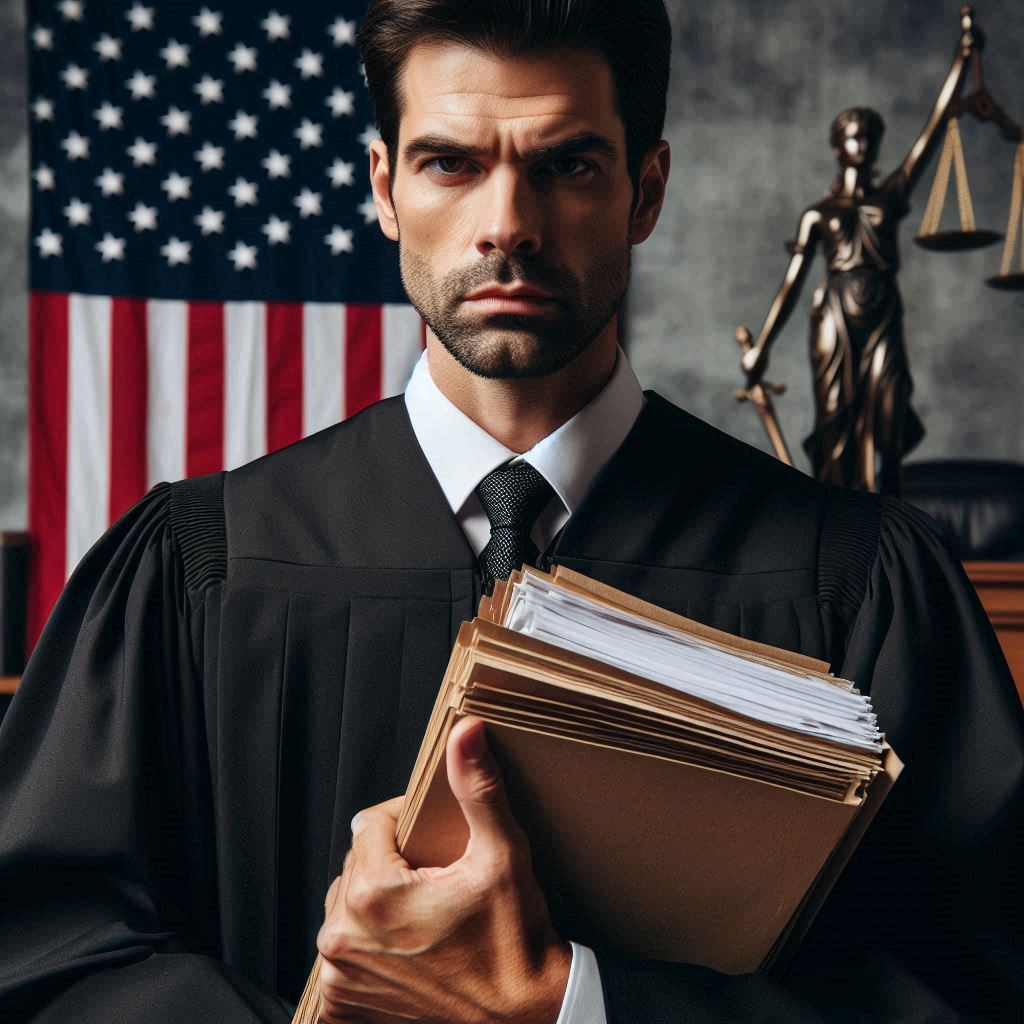Introduction
High-profile cases can significantly impact prosecutors’ careers. These cases often attract public attention and intense media scrutiny.
High-Profile Cases Explained
High-profile cases involve significant public interest due to their nature or the people involved.
They can include major criminal cases, celebrity trials, or cases with substantial societal implications.
These cases often dominate news headlines and capture the public’s attention for extended periods.
Definition of Prosecutors
Prosecutors are legal professionals representing the government in criminal cases.
They present evidence against accused individuals and seek to prove their guilt beyond a reasonable doubt.
Prosecutors play a critical role in the criminal justice system, ensuring laws are upheld and justice is served.
Overview of the Topic
The impact of high-profile cases on prosecutors’ careers can be profound.
Handling such cases can bring significant professional and personal challenges.
Prosecutors may experience increased visibility and scrutiny, affecting their reputation and career trajectory.
High-profile cases can serve as career milestones.
Successfully managing a high-profile case can enhance a prosecutor’s reputation, demonstrating their legal acumen and ability to handle complex situations.
This can lead to career advancements and recognition within the legal community.
However, the pressure and scrutiny associated with high-profile cases can also bring challenges.
Prosecutors must navigate intense media attention, public opinion, and sometimes even threats to their safety.
The outcome of these cases can heavily influence their career, impacting future job opportunities and professional relationships.
Prosecutors handling high-profile cases must maintain professionalism and integrity.
Their decisions and actions are closely watched, and any misstep can have lasting consequences.
Balancing the demands of a high-profile case with ethical obligations and personal well-being is crucial.
The impact of high-profile cases on prosecutors’ careers also extends to their personal lives.
The stress and demands of these cases can affect their mental and emotional health.
Prosecutors may face long hours, intense pressure, and the challenge of maintaining work-life balance.
Support from colleagues, mentors, and mental health professionals can be vital in managing these challenges.
Explanation of high-profile cases
High-profile cases draw significant public and media attention due to their nature or the individuals involved.
These cases often involve serious crimes, prominent figures, or issues of substantial societal interest.
Definition of High-Profile Cases
High-profile cases are legal proceedings that receive extensive media coverage and public interest.
These cases usually involve serious crimes, such as murder, terrorism, or corruption.
High-profile cases can also include trials of celebrities or public officials.
Examples of High-Profile Cases
One notable example is the O.J.Simpson trial.
This case involved a former football star accused of murder, captivating the nation.
The media frenzy and public interest in the trial were unprecedented.
Another example is the trial of Derek Chauvin, the former police officer charged with the murder of George Floyd.
This case sparked worldwide protests and highlighted issues of police brutality and racial injustice.
The trial of Elizabeth Holmes, the founder of Theranos, is another high-profile case.
Accused of fraud, Holmes’ trial drew significant media attention due to her company’s rise and fall in the tech industry.
Importance of High-Profile Cases in the Legal System
High-profile cases play a crucial role in the legal system.
They often bring attention to important legal and social issues, influencing public opinion and policy.
These cases can set legal precedents, shaping future judicial decisions.
The outcomes of high-profile cases can impact legislation and legal practices, making them pivotal in the evolution of the legal system.
High-profile cases also demonstrate the transparency of the legal process.
Public scrutiny ensures accountability and fairness in the judicial system.
The attention these cases receive can promote trust in the legal system when justice is seen to be served.
Moreover, high-profile cases can highlight flaws or strengths within the legal system.
They can expose biases, procedural issues, or the effectiveness of legal reforms.
This scrutiny can drive improvements and reforms in the justice system.
High-profile cases also provide learning opportunities for legal professionals.
Prosecutors, defense attorneys, and judges can gain insights and experience from handling such cases.
They can learn to manage media attention, public opinion, and the unique challenges these cases present.
In summary, high-profile cases are significant due to their impact on public awareness, legal precedents, and the justice system’s transparency.
They involve serious crimes or prominent figures, attracting widespread media coverage and public interest.
Examples like the O.J. Simpson trial, Derek Chauvin’s case, and Elizabeth Holmes’ trial illustrate the diversity and importance of high-profile cases.
Understanding high-profile cases helps appreciate their role in shaping the legal landscape.
They influence public opinion, drive legal reforms, and provide valuable learning experiences for legal professionals.
High-profile cases underscore the importance of a transparent, accountable, and evolving justice system.
Read: Evolution of the Legal Profession in the USA: A Timeline
Responsibilities of prosecutors in high-profile cases
Prosecutors in high-profile cases have a range of responsibilities that can greatly impact their careers.
These responsibilities include:
Gathering evidence
One of the most important tasks for prosecutors in high-profile cases is gathering evidence to build a strong case against the defendant.
This involves collecting physical evidence, interviewing witnesses, and analyzing data to present a compelling case in court.
Facing media scrutiny
Prosecutors in high-profile cases often find themselves under intense media scrutiny.
They must navigate the media landscape carefully to ensure that accurate information is being disseminated and to protect the integrity of the case.
Managing public perception
Public perception can play a significant role in the outcome of high-profile cases.
Prosecutors must carefully manage how they are perceived by the public, as negative publicity can harm their credibility and impact their careers.
Ensuring a fair trial
Prosecutors are tasked with ensuring that defendants receive a fair trial, regardless of the high-profile nature of the case.
This involves upholding the principles of justice and ensuring that all parties involved are treated equitably.
Essentially, prosecutors in high-profile cases have a range of responsibilities that can significantly impact their careers.
By effectively gathering evidence, facing media scrutiny, managing public perception, and ensuring a fair trial, prosecutors can navigate these challenging cases successfully.
Read: Balancing Life: How US Lawyers Manage Stress and Burnout
Impact of High-Profile Cases on Prosecutors’ Careers
High-profile cases significantly impact prosecutors’ careers.
These cases bring increased pressure, potential reputation damage, career advancement opportunities, and a personal toll.
Increased Pressure and Stress
Prosecutors handling high-profile cases face immense pressure.
The public and media closely scrutinize their every move.
This intense scrutiny can lead to heightened stress levels.
Prosecutors must manage media relations while ensuring a fair trial.
They often work long hours, balancing the demands of the case with their personal lives.
Potential for Reputation Damage
High-profile cases carry a high risk of reputation damage.
A misstep can tarnish a prosecutor’s career.
Public opinion can shift quickly, especially with extensive media coverage.
If a high-profile case results in an unfavorable outcome, the prosecutor may face severe criticism.
Even if the outcome is favorable, the methods used can come under scrutiny, impacting the prosecutor’s reputation.
Career Advancement Opportunities
Despite the risks, high-profile cases can provide significant career advancement opportunities.
Successfully handling a high-profile case can catapult a prosecutor’s career.
It can lead to promotions, higher-profile assignments, and increased visibility in the legal community.
These cases offer a chance to demonstrate legal expertise and composure under pressure.
Personal Toll on Prosecutors
High-profile cases can take a substantial personal toll on prosecutors.
The stress and long hours can affect their mental and physical health.
The pressure to succeed can lead to burnout.
Prosecutors may struggle to balance their professional and personal lives, impacting their relationships and overall well-being.
The emotional burden of dealing with serious crimes can also be overwhelming.
In summary, high-profile cases have a profound impact on prosecutors’ careers.
These cases bring increased pressure and stress, potential for reputation damage, and career advancement opportunities.
However, they also take a significant personal toll on prosecutors.
Balancing the demands of high-profile cases with personal well-being is a constant challenge for prosecutors in the spotlight.
Transform Your Career Today
Unlock a personalized career strategy that drives real results. Get tailored advice and a roadmap designed just for you.
Start NowRead: Case Law Basics: Noteworthy US Legal Precedents

Strategies for prosecutors to navigate high-profile cases
Prosecutors facing high-profile cases often find themselves under immense pressure and scrutiny.
These cases can have a significant impact on their careers, making it essential for them to navigate them effectively.
Here are some strategies for prosecutors to successfully handle high-profile cases:
Building a Strong Case
Building a strong case is crucial in high-profile cases, where there is often intense public interest.
Prosecutors should conduct thorough investigations, gather compelling evidence, and work closely with law enforcement to ensure a solid case.
Seeking Support from Colleagues
Prosecutors should not hesitate to seek support and advice from their colleagues.
Collaborating with experienced attorneys can be beneficial in navigating the complexities of high-profile cases and sharing strategies for success.
Managing Media Relations
Handling media relations is another critical aspect of prosecuting high-profile cases.
Prosecutors must communicate effectively with the media, balancing transparency with the need to protect the integrity of the case.
Developing a proactive media strategy can help prosecutors control the narrative and avoid misinformation.
Prioritizing Self-Care
In the midst of the intense pressure and demands of high-profile cases, prosecutors must prioritize self-care.
It’s essential to maintain a healthy work-life balance, engage in stress-relieving activities, and seek professional support if needed.
Taking care of their mental and physical well-being is crucial for prosecutors to perform at their best during such challenging cases.
In fact, prosecutors facing high-profile cases can successfully navigate them by building a strong case, seeking support from colleagues, managing media relations effectively, and prioritizing self-care.
By employing these strategies, prosecutors can effectively handle the pressures and complexities of high-profile cases while safeguarding their careers.
Read: A Day in the Life: What to Expect as a U.S. Court Reporter
Case Studies of Prosecutors Affected by High-Profile Cases
High-profile cases can define a prosecutor’s career.
This section explores success stories, challenges faced, and lessons learned from notable prosecutors.
Success Stories
Marcia Clark’s work on the O.J. Simpson trial is well-known.
Although the case ended in acquittal, her dedication and resilience were commendable.
She faced immense media scrutiny but remained focused. Her high-profile involvement led to a successful career in writing and television.
Robert Morgenthau, a legendary Manhattan District Attorney, handled numerous high-profile cases.
His successful prosecution of mob bosses and white-collar criminals solidified his reputation.
Morgenthau’s career showcased the positive impact high-profile cases can have on a prosecutor’s legacy.
Challenges Faced
Prosecutors often face intense pressure during high-profile cases.
Linda Fairstein, head of the sex crimes unit in Manhattan, prosecuted the Central Park Five case.
The wrongful convictions and subsequent exonerations damaged her reputation.
The case highlighted the challenges of ensuring justice while under public and media pressure.
Another example is Kenneth Starr, who led the investigation into President Bill Clinton.
The politically charged nature of the case exposed him to significant criticism.
The intense scrutiny and political backlash were immense challenges he had to navigate.
Lessons Learned
High-profile cases offer valuable lessons for prosecutors.
One key lesson is the importance of maintaining integrity.
Mike Nifong, the prosecutor in the Duke lacrosse case, faced disbarment for ethical violations.
This case underscores the necessity of adhering to legal and ethical standards, even under pressure.
Prosecutors also learn the importance of managing media relations.
Marcia Clark’s experience during the O.J. Simpson trial highlighted the need for effective communication with the media.
She later emphasized the importance of staying composed and focused despite media distractions.
Building a support system is another crucial lesson.
High-profile cases can be isolating and stressful.
Robert Morgenthau’s success was partly due to his ability to build a strong team.
Having a reliable team helps manage the workload and provides essential emotional support.
Basically, high-profile cases significantly impact prosecutors’ careers.
Success stories like Marcia Clark and Robert Morgenthau illustrate the potential career benefits.
However, challenges such as those faced by Linda Fairstein and Kenneth Starr highlight the pressures and risks involved.
Key lessons learned include maintaining integrity, managing media relations, and building a strong support system.
High-profile cases can define a prosecutor’s career, for better or worse, depending on how they navigate these challenges.
Conclusion
High-profile cases significantly impact prosecutors’ careers.
These cases demand intense scrutiny, challenging even the most experienced prosecutors.
They often work long hours and face immense pressure to secure convictions.
This stress can lead to burnout and affect their mental health.
However, these cases also offer opportunities for career advancement and recognition.
A successful outcome in a high-profile case can catapult a prosecutor’s career.
It can lead to promotions, better job offers, and public recognition.
Their reputation in the legal community can strengthen, opening doors to new opportunities.
Conversely, a loss can damage their career, leading to criticism and questioning of their competence.
Support systems are crucial for prosecutors handling high-profile cases.
These systems include professional mentors, peer networks, and mental health resources.
Mentors provide guidance and advice based on their own experiences with high-profile cases.
Peer networks offer emotional support and camaraderie, helping prosecutors manage stress.
Access to mental health resources ensures they maintain their well-being throughout these challenging cases.
[E-Books for Sale]
The Big Book of 500 High-Paying Jobs in America: Unlock Your Earning Potential
$19.99 • 500 High-Paying Jobs • 330 pages
Explore 500 high-paying jobs in America and learn how to boost your career, earn more, and achieve success!
See All 500 High-Paying Jobs of this E-Book
1001 Professions Without a Degree: High-Paying American Jobs You Can Start Now
$19.99 • 1001 Professions Without a Degree • 174 pages
Discover 1001 high-paying jobs without a degree! Unlock career tips, skills, and success strategies for just $19.99!




